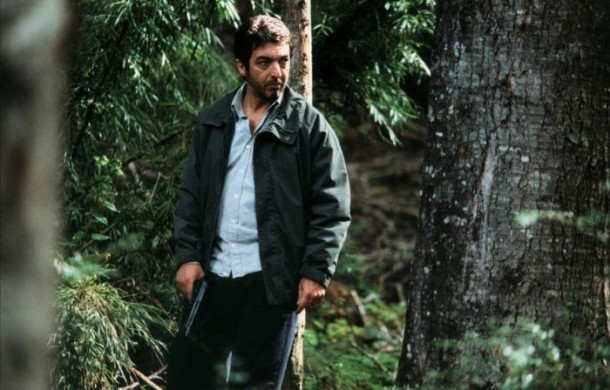
Writer/Director Fabián Bielinsky
Cast: Ricardo Darin, Dolores Fonzi, Alejandro Awada, Pablo Cedrón, Jorge D’Elia, Manuel Rodal, Rafael Castejón, Walter Reyno, Nahuel Pérez Biscayart
Argentina-Spain-France / Drama / 134mins
El Aura (The Aura) was the second and final feature of the up and coming young Argentinian director Fabián Bielinsky (1959-2006) who died suddenly from a heart attack aged only 47 having just collected a host of awards for this film. His quirky debut feature Nueve Reinas (Nine Queens, 2000) had enjoyed a West End run in 2002 and received the mixed accolade of a Hollywood remake in 2004. But despite the acclaim El Aura received elsewhere, in Britain it was only screened once in an Argentinian season at the Riverside before dropping off the radar (although it can be found subtitled on YouTube) until recently revived at the Prince Charles.
It’s difficult to discuss this film without revealing the increasingly unpredictable turns the narrative takes, so I shall attempt to be vague. (Films, however, that it recalled for me for various reasons included D.O.A., Rififi, Bob le Flambeur, Le Deuxième Soufflé, The Passenger, House of Games and The Usual Suspects). One of Argentina’s top actors Ricardo Darin plays Esteban Espinosa – possibly the screen’s most bemused taxidermist since Norman Bates – whose fantasy of pulling off the perfect heist suddenly seems about to come to fruition due to an accident while hunting in Patagonia (he promptly acquires a familiar of sorts in the form of an attentive wolf with one blue eye and one brown who spends the rest of the film keeping a watchful eye on him). Did I mention that Esteban also happens to be an epileptic? The film begins with him regaining consciousness after a seizure and he later suffers two more at inopportune moments; the possibility arising that what we witness may be some sort of Incident at Owl Creek hallucination resulting from his epilepsy.
The narrative develops in a series of very gradual leisurely paced steps, with long stretches wholly devoid of dialogue, the camera concentrating upon Esteban’s face, and the photography simultaneously drab and atmospheric. Esteban is invariably a step or two behind developments which although realistically depicted often involve extraordinary coincidences, through which he is always able to muddle his way because he happens to possess a photographic memory (did I neglect to mention that too?) invoked in the style of the final scene in the interview room in The Usual Suspects. His phenomenal memory comes to the rescue in a number of very awkward situations with the mean-looking collection of hoods he incongruously now finds himself in the company of (like Edmond O’Brien in DOA), until it abruptly fails him with cataclysmic results. How much of this is actually happening is open to speculation. What violence there is fairly restrained in its depiction, but its impact on some of the characters – if it did really happen – leaves a bad taste in the mouth. RICHARD CHATTEN.
SCREENING AT PRINCE CHARLES CINEMA LONDON W1 | NOW AVAILABLE ON AMAZON